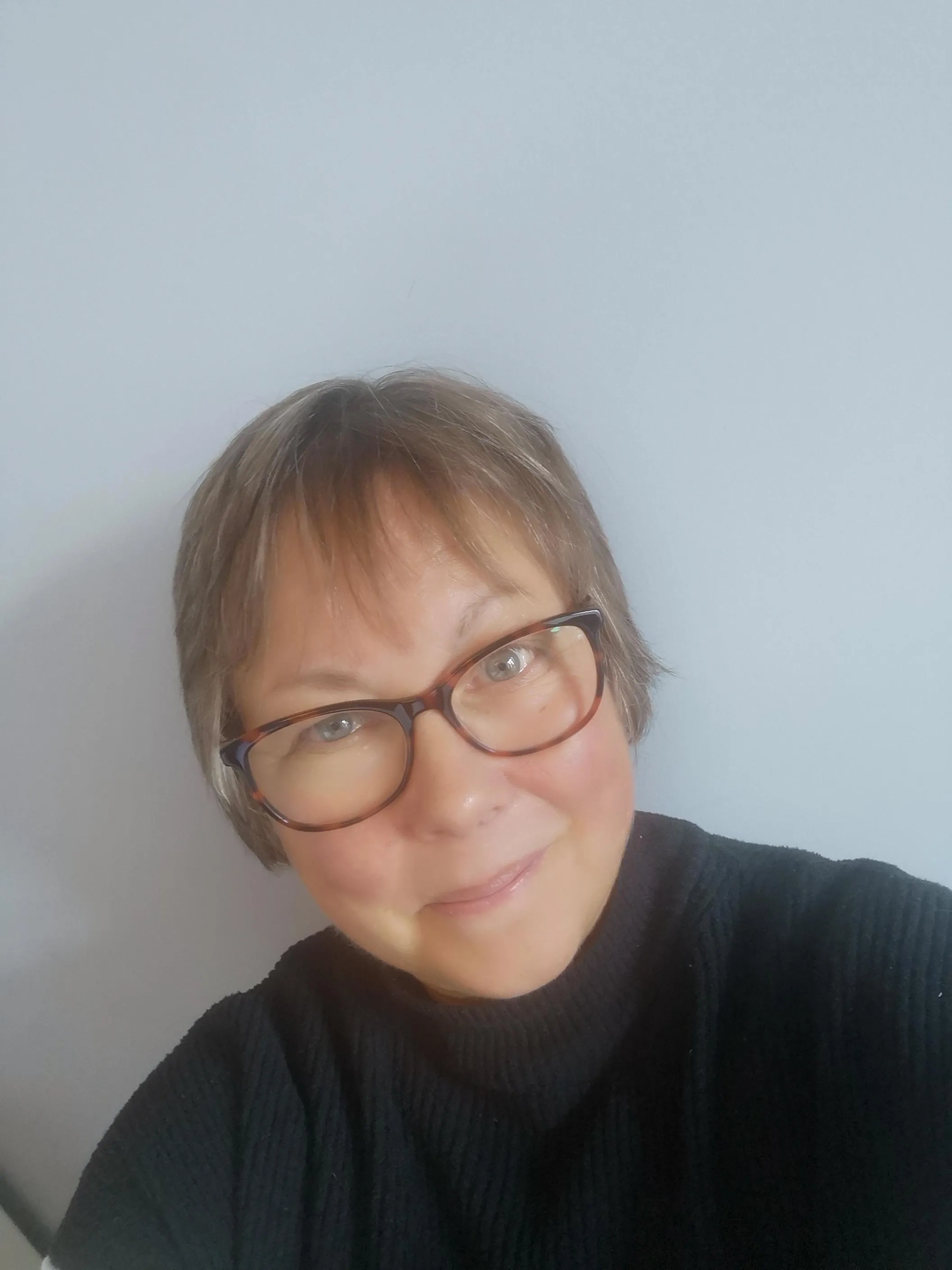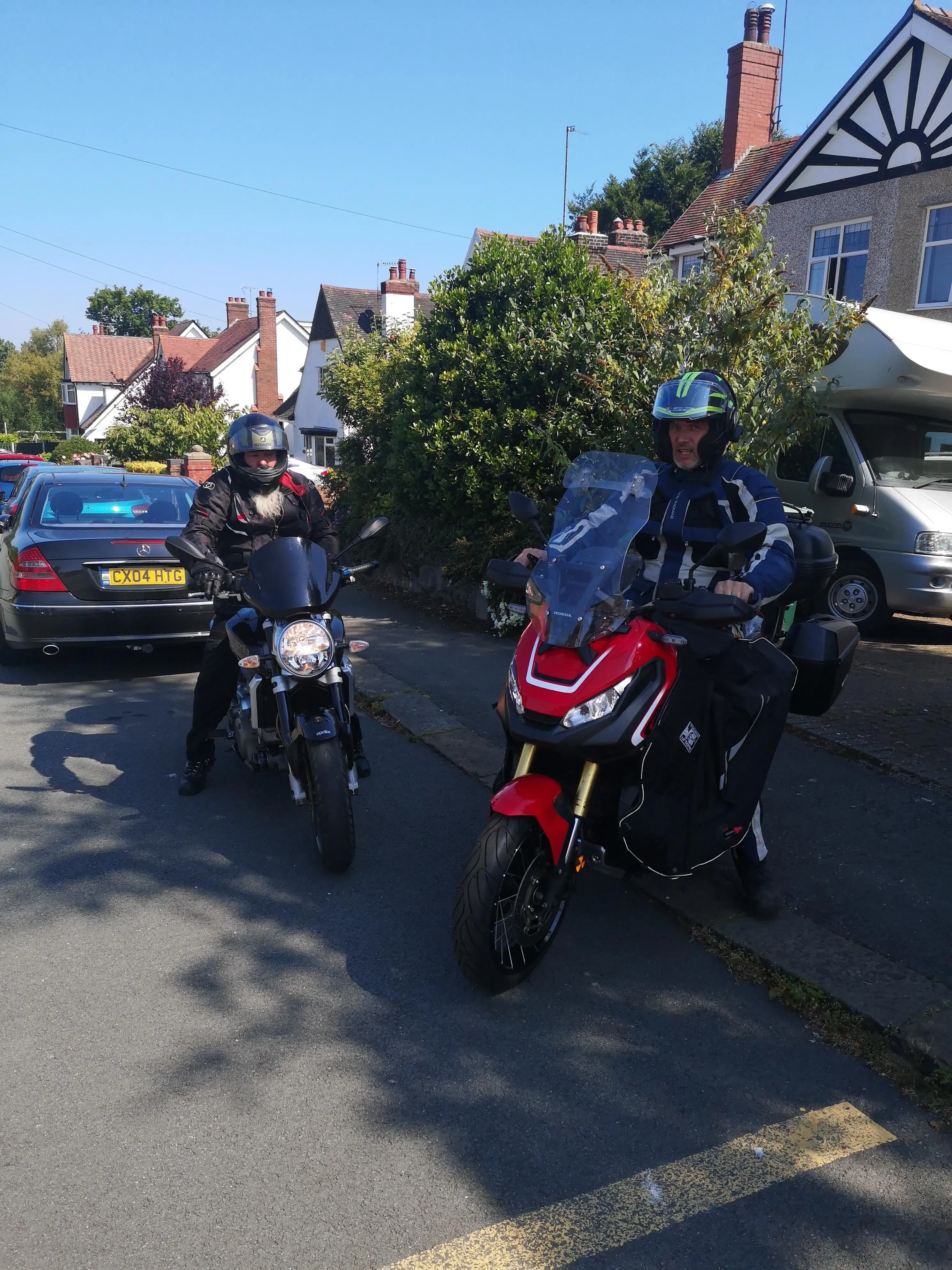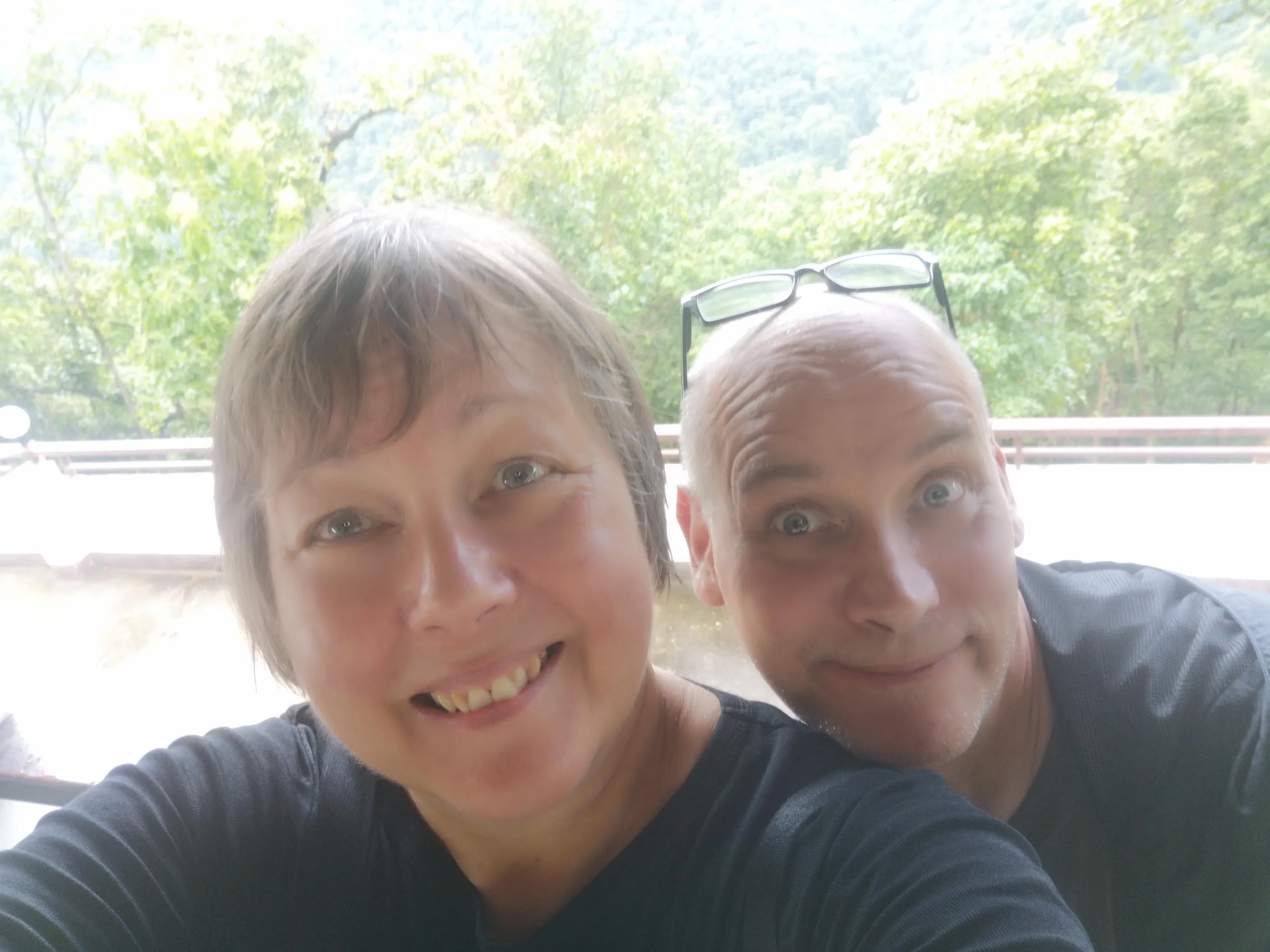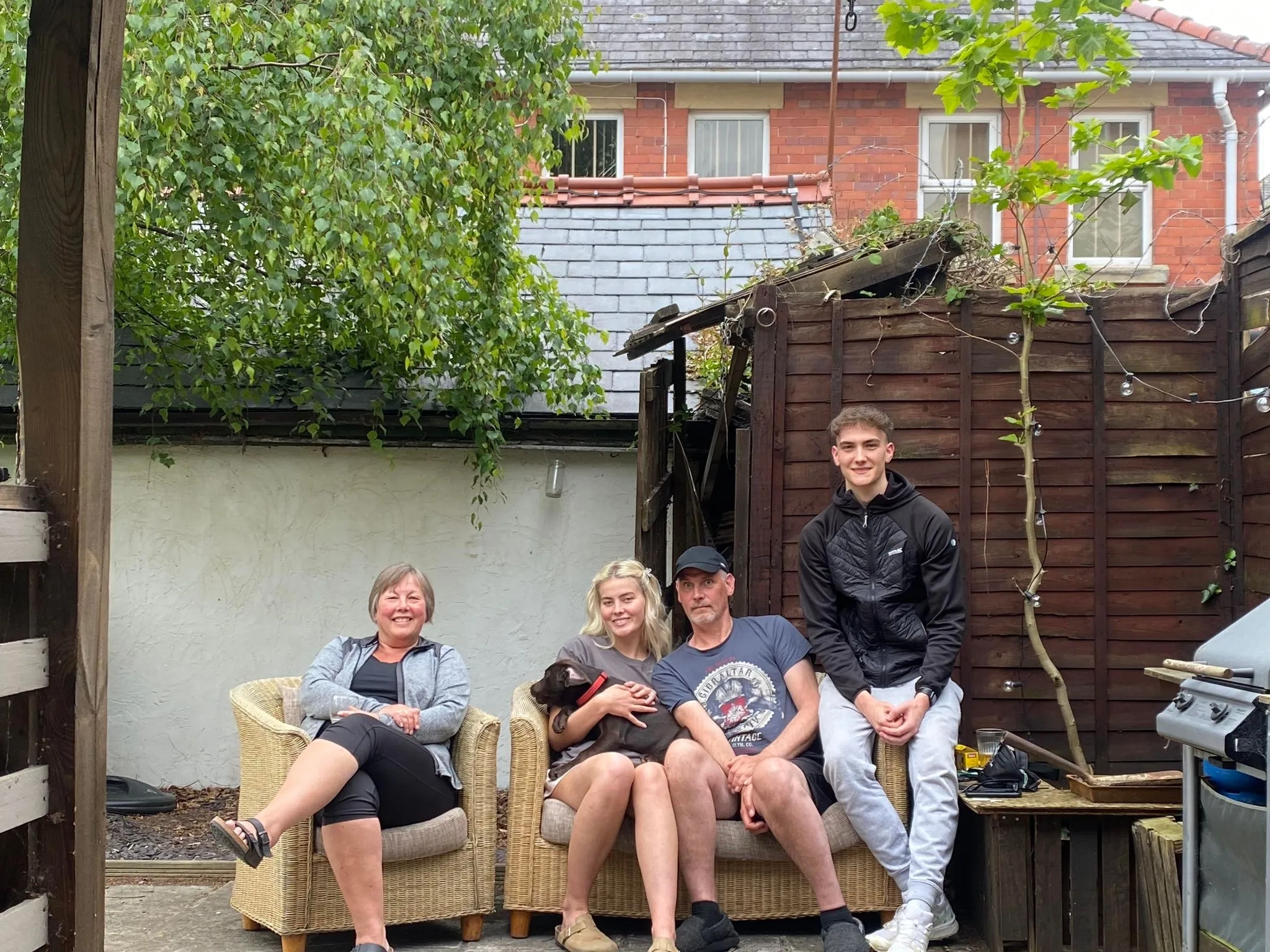Tracy lives in Colwyn Bay, Wales, with her husband Dave and their two children. Here, Tracy discusses the emotional toll of an MND diagnosis, the importance of quality time together, and the practical challenges of managing daily life whilst preparing to become a full time carer.
Life before MND
"It's the unpredictability of the disease, you just don't know what's going to happen next."
My husband, Dave is 54, and I'm 59. We live in Colwyn Bay, North Wales. It’s a lovely seaside town. Dave and I got a new lease of life when the children turned 18 or 19. Both kids are still living at home and have jobs. Dave’s got a son who is 25, then together we've got Sophie who is 21, and Robert is 20. Dave was going to look at retirement at around 55 or 60, but things have changed a lot since then. Now, we have to think about what we do, and we have to plan. It's the unpredictability of the disease, you just don't know what's going to happen next. We had lots of our own interests. Dave's a keen motorcyclist so he would be tinkering around with motorbikes, fixing things in his garage, and he'd go out for an afternoon on his motorbike. I would enjoy going walking, and we would enjoy walking together if we had the opportunity to do that as well.
Early symptoms and diagnosis
"We went away on holiday not knowing, which I'm so pleased about."
We started noticing in March or April 2023 slurred speech first of all. He'd come home on a Friday, and it would be like he'd been drinking. We put it down to being tired. Then people in work started noticing and making little jokes, and he noticed he wasn't recovering as well from his shift work. He started noticing cramps in his legs and put it down to old age. But in July last year, we decided to go to the GP because it was becoming more noticeable, and it wasn't just when he was tired. To be honest, we've had an amazing experience from GP to diagnosis. We went to the GP on 5 July 2023. First of all, they thought maybe it was mini strokes he was having. Then they suggested a CT scan, because it was definitely something cognitive. Dave had the CT scan and as a result of that, they suggested a nerve study. We had that at the beginning of September, and we were going on holiday to Thailand mid-September. We went away on holiday not knowing, which I'm so pleased about. We got a letter through while we were away on holiday to book an appointment to go to The Walton Centre, which is our nearest neurological MND area. We came back from holiday 2 October, went to The Walton Centre October on the 5 October, and the rest is history.
Probably a year before that, I would tell Dave to stop mumbling because I couldn't understand what he was saying. It wasn't slurred, but there was no movement in his mouth. I would have to be looking at him intently. He would say he's just a lazy talker, but we actually think maybe that was a very early sign of something.
Planning to care
"I came to the realisation that I can't do everything, and I'd have to give up my job."
Dave got his diagnosis in October, and when we first got the diagnosis, we thought we could cope. Then, about three months ago, we had a particularly bad week, and I came to the realisation that I can't do everything, and I'd have to give up my job. I was working full time as a personal assistant to the managing director in a construction company, but I finished at the end of May. Fortunately, they've given me a sabbatical for a year, so that's good, and my company has been really supportive.
The other thing for Dave is he knows how much I love my job, so that's really affected him emotionally in the fact that he knows how much I'm having to give up because of his condition. I don't want him to feel like he's restricting me or his family from doing stuff.
Progression of MND
"He feels really conscious because he sounds as if he's drunk because of his speech."
Things aren't great at the moment. It's really progressing fast. Once you're given diagnosis, you're looking for stuff, so anything that's happening to him differently every day, he's picking up on. I think it's a loss that he feels about stuff. First, he had weakness in his right hand and his left leg and slurred speech. Now it's progressed and he's finding it difficult to walk around and he’s got a mobility scooter.
He fell yesterday and couldn't get himself up. It was in the street, and he had nobody with them. He went out in his car, and normally, everything would be fine, but he tripped, and he had some people helping him, but he feels really conscious because he sounds as if he's drunk because of his speech.
We went out one Saturday afternoon, which we would have done prior to diagnosis, and he's got a mobility scooter, so we walked down to Colwyn Bay. When we came back he said, "it felt normal today" because we were doing something we would have done before.
Caring responsibilities
"It's just about being there really, at this stage."
Day-to-day it's making sure he's got his saliva medication, which is in a syringe, so prepping that and making sure the syringe has the right amount in the mornings. He's pretty good at taking his medication morning and night. It's that fine line between allowing him his independence and intervening. I might pop my head in when I know he's getting up and help him if he needs a hand putting his socks on, but it's just about being there really, at this stage. So, helping him get dressed, being aware when he's coming down the stairs in case he needs a hand doing that, but he still wants to do that on his own, so I suppose it's more about being around, but not in his face all the time. He'll still make himself a coffee and stuff like that, but I'll make sure he's eaten something. I made him a cooked breakfast the other day, and before, I would have just given him the breakfast, whereas now, I need to cut it up because his dexterity isn't there with regards to cutting food up. At the moment, he can eat anything because he's not losing any weight so I'm making sure he’s eating whatever he wants whenever he wants, because obviously, as it progresses, he won't be able to do that.
Association support
"I’ve found the MND Association really good for signposting."
I've met with our Association Visitor, she's made contact with me, and she's there as and when I need her, so that's good, but I think I get more from the carers meetings at the moment. We've had the cost-of-living grant, that was promoted to us by our Area Support Coordinator, Jo. I was talking to her on the phone about something, it was the midwinter, and I was saying that we were having a fire in the front room because we were concerned about putting the heating on. Dave, with this condition has noticed if his joints are cold, it actually makes the condition worse so Jo said we could have the cost-of-living grant to help with that. She sorted it all out for us and then it was in our bank account. It was amazing.
I’ve found the MND Association really good for signposting. I go on the forums every now and again, even though I don't interact with it, I do have a look on there to see some of the threads that are going on to see if there's anything in there that I can latch on to. We used the benefits advice service through the MND Association, which was really informative, very helpful and very straightforward. They guided us through what we could claim for and what we couldn't claim for, it was brilliant.
Looking at MND differently
"Rather than thinking to the future, it's about short-term goals, so not next week, but today."
The weekend after we got the diagnosis we went on a lakeside walk and obviously it was a really emotional time. David was walking along, we were talking, and he was saying how upset he was and how his life's going to be cut short, and I said to him, "when you look back at the life we've had together since 2000, what do you think about what we've done?" and he said "I think it's amazing. I've had the best time. We've got two amazing kids, I've enjoyed the jobs I've done, we've travelled abroad, and we’ve been to Thailand, I’ve had all the motorbikes I’ve wanted. It's been brilliant." And I said, "but isn't that a wonderful place to be? We need to focus on the fact it has been amazing."
Rather than thinking to the future, it's about short-term goals, so not next week, but today.
We've got a puppy - we must be mad because we've never had a dog - but we've not been able to have a dog before because we both work full time so we decided it would be a nice distraction, and she is. She's lovely. She was able to go out for the first time this week and today, I said, "I'm thinking to take the puppy for another walk. Just 15 minutes or so around the block" Dave came along as well and it was a great start to the day. It's those little things, really.
Advice to others
"Life shouldn't have to stop because of MND."
Don't refuse any help, reach out, go to the carers meetings. I have a good support network, but there's so many ways of communicating with people nowadays. We exchanged numbers with another lady who's in the carers group, and we've said if we're having a bad day or a good day, we'll message each other. I'm very much a people pleaser and I like helping people. People will often say "if you need anything, just let me know" and I would never have taken them up on that before, but every now and again I'll message the group of friends I have and ask for some help. Life shouldn't have to stop because of MND. We actually did say until MND takes over our life, let's not make it part of our life. Let's carry on doing the things we can do until we get to a point MND comes in and we can't do it anymore.
Back to Global MND Awareness Day webpage



